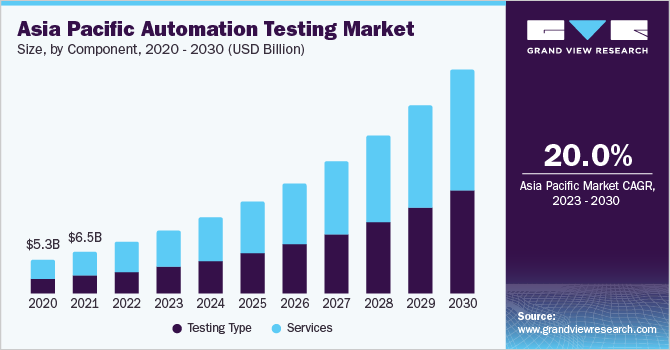Automation Testing Market: Post-Pandemic Recovery and Growth Projections

The global automation testing market was valued at USD 25.43 billion in 2022 and is projected to grow significantly, reaching USD 92.45 billion by 2030. This growth reflects a compound annual growth rate (CAGR) of 17.3% from 2023 to 2030. The increasing adoption of advanced testing approaches such as DevOps and Agile methodologies is a key driver of this expansion. These practices reduce automation analysis time and enable faster time-to-market for software products.
As businesses continue to rely heavily on mobile applications, the fast-paced digital transformation across various industries is creating a pressing need for automation testing. Additionally, evolving workplace dynamics are further contributing to market growth.
The integration of artificial intelligence (AI) and machine learning (ML) is accelerating the shift toward automation testing. AI reduces the test lifecycle and is now applied across all testing types—including functional, regression, performance, and automation testing. The increasing adoption of cloud-based automation tools is also fueling growth. These platforms are cost-effective, scalable, and flexible, making them especially appealing to small and medium-sized enterprises (SMEs) and startups. Furthermore, AI and ML integration is simplifying cloud-based automation testing solutions, driving further adoption.
Key Market Trends & Insights
- North America led the market in 2022, accounting for 39% of total revenue. The region's strong presence of technology vendors and the growing popularity of smart consumer devices—such as TVs, laptops, and home appliances—are boosting demand for automation testing. These devices are deeply connected with software, web applications, and operating systems.
- By component, the service segment held the largest market share, contributing over 56% of revenue in 2022. Implementation services played a major role, helping businesses integrate automation testing into existing infrastructures with ease.
- By organization size, large enterprises dominated the market, holding over 68% of the revenue share in 2022. These organizations rely on automation testing to handle complex systems, numerous applications, and extensive test cases—enhancing test efficiency, reducing manual work, and ensuring software quality.
- By industry vertical, the BFSI (Banking, Financial Services, and Insurance) segment held more than 15% of the market in 2022. The push toward digitalization within the BFSI sector has increased demand for automation testing of sophisticated and mission-critical applications. These systems require frequent updates to stay aligned with evolving technological requirements.
Order a free sample PDF of the Automation Testing Market Intelligence Study, published by Grand View Research.
Market Size & Forecast
- 2022 Market Size: USD 25.43 Billion
- 2030 Projected Market Size: USD 92.45 Billion
- CAGR (2023-2030): 17.3%
- North America: Largest market in 2022
Key Companies & Market Share Insights
Major players in the market are pursuing strategies such as product innovation, mergers and acquisitions, partnerships, and geographic expansion to boost market share. For instance, in June 2023, Keysight Technologies, Inc. expanded its autonomous driving validation test portfolio by launching the E8717A Lidar Target Simulator (LTS). This innovation helps automotive OEMs and lidar sensor manufacturers test and certify their lidar systems for autonomous vehicles.
Key Players
- IBM Corporation
- Apexon
- Accenture
- Cigniti Technologies
- Capgemini SE
- Microsoft
- Tricentis
- Keysight technologies
- Sauce Labs
- Parasoft
Explore Horizon Databook – The world's most expansive market intelligence platform developed by Grand View Research.
Conclusion
The global automation testing market is experiencing robust growth, driven by rapid digitalization, the adoption of AI and ML, and the increasing need for agile and efficient software development practices. North America continues to lead the market, with large enterprises and sectors like BFSI significantly contributing to demand. As cloud-based and AI-enhanced automation tools become more accessible, the market is expected to grow further, offering substantial opportunities for both established players and emerging startups through 2030.
- Art
- Causes
- Crafts
- Dance
- Drinks
- Film
- Fitness
- Food
- Games
- Gardening
- Health
- Home
- Literature
- Music
- Networking
- Other
- Party
- Religion
- Shopping
- Sports
- Theater
- Wellness


